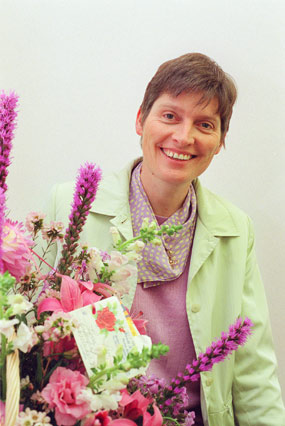Hau wins MacArthur
Physicist recognized for work with light

Lene Hau, the woman who stopped light completely, then released it at will, has won a $500,000 MacArthur Fellowship. She and 22 other winners will receive $100,000 a year for the next five years to spend as they wish. No accounting of how the money is spent is required by the giver of the awards, the John D. and Catherine T. MacArthur Foundation of Chicago.
No application or interview occurs prior to these awards, and those who nominate and select the winners remain anonymous. The Foundation makes only one call, and that call often changes a person’s life.
“I was totally stunned when I got the call,” says Hau, Gordon McKay Professor of Applied Physics and Professor of Physics. “I didn’t have a clue. It’s a tremendous honor.”
Hau hasn’t decided what to do with the money yet. “I have to think about it very carefully,” she says. “It gives me such tremendous freedom.”
Jonathan Fanton, president of the MacArthur Foundation, said that Hau and the selected fellows have provided “the imagination and fresh ideas that can improve people’s lives and bring about movement on important issues.”
• Video: Light and matter (2007) (1:52)
• Video: Light stopper (2001) (2:52)
Earlier this year, Hau, 41, accomplished what even Albert Einstein thought was impossible. She slowed light to a standstill then released it. The feat adds greatly to our understanding of the interaction between light and matter, and opens the way to building new types of computers that could make the supercomputers of today look puny. Other practical applications include news ways to communicate solely by light and coding methods to protect military and personal information.
The other fellows include a psychologist who has enhanced our understanding of depression and suicide, a biologist whose experiments are revealing the complexities of insect flight, and a naturalist who studies the behavior of wild African elephants.
Making new matter
“The Fellowship will allow me to keep moving into new fields of research,” Hau says. “Typically, it is very difficult to get funding when you want to make a 90-degree change in the kind of research you are known for doing.”
Hau received her B.S., M.S., and Ph.D. degrees from the University of Aarhus in Denmark. Her training focused on theoretical physics, but her interest turned to experimental efforts to create a new form of matter known as a Bose-Einstein condensate. Einstein and Indian physicist Satyendra Nath Bose theorized that it should be possible to cool atoms to the point where they lose their individuality and lock together into a single superatom that would have properties like no other type of matter. Hau applied to the National Science Foundation for funds to make a batch of this condensate but was rejected on the grounds that she was a theorist for whom such experiments would be too difficult to do.
However, Hau got funding from the Rowland Institute of Science in Cambridge, Mass., and 15 months later she became one of a handful of scientists who made the superatom soup. In 1998, she used the condensate to slow light from its natural speed of 186,282 miles a second to a pokey 38 mph.
Hau continued these experiments and last year succeeded in bringing light to a full stop. After parking it for a thousandth of a second, she and her colleagues brought the beam of light up to full speed again.
This work gained Hau a tenured professorship at Harvard and a new laboratory there where she can further explore the basic and practical implications of controlling the speed of light.
“If I discover a totally new area of research that I want to work in, the fellowship gives me the funds to pursue it without being told that it’s not my field,” Hau says.
That’s a good example of what Daniel Socolow of the MacArthur Foundation meant when he said “the fellowships will provide new freedom and opportunity … in support of these fellows’ demonstrated potential for still greater achievement.”




